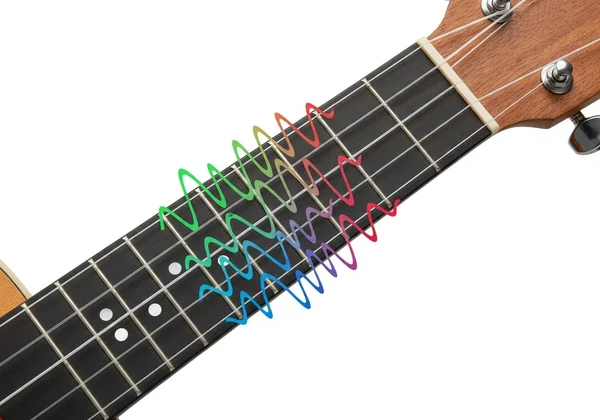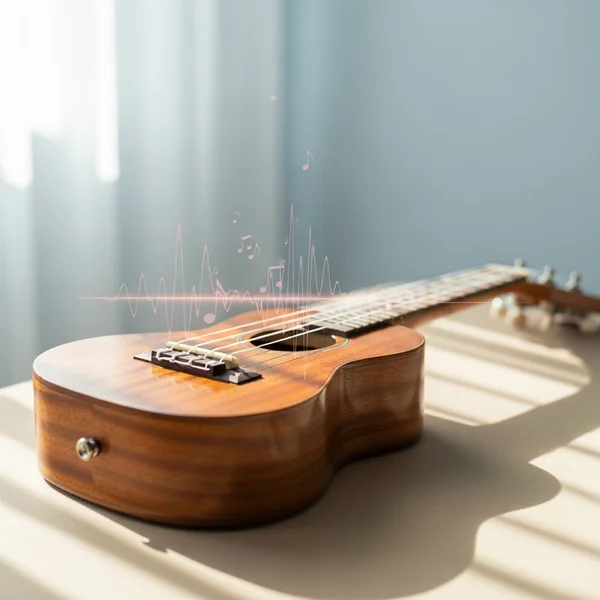Tune Your Ukulele with Our Online Tuner: Fixing Intonation & Staying in Tune
Are you a ukulele player who painstakingly tunes your instrument, only to find it sounds off a few minutes later, or when you play chords? You're not alone! Many musicians face this frustration, wondering why their ukulele stays out of tune despite their best efforts. Is an online tuner accurate enough for ukulele intonation checks? In this guide, we'll explore the common, often overlooked reasons your ukulele might sound out of tune even after tuning, and provide actionable steps to achieve lasting pitch perfection. For quick and reliable tuning, remember to visit our online tuner, your free solution for perfect pitch.

Understanding Ukulele Intonation: The Key to True Pitch
Before we dive into troubleshooting, let's clarify a crucial concept: ukulele intonation. While tuning ensures your open strings are at the correct pitch, intonation refers to how accurately your instrument stays in tune across the entire fretboard. A perfectly tuned ukulele can still sound "off" when fretting notes if its intonation is poor.
What is Intonation and Why It Matters for Your Ukulele?
Intonation is the accuracy of an instrument’s pitch along its fretboard. On a ukulele, it means that when you tune your open strings (GCEA for standard tuning), the notes you play higher up the neck (e.g., at the 7th or 12th fret) are also in tune relative to those open strings. If your ukulele has poor intonation, chords will sound dissonant, and melodies will sound sharp or flat, even if the open strings are perfectly tuned. This can significantly impact your playing experience and musicality.
Signs of Poor Ukulele Intonation: How to Spot the Problem
Recognizing signs of poor ukulele intonation is the first step toward fixing it. Here’s what to look for:
- Chords sound bad: If individual strings are tuned correctly but chords sound muddy or sour, poor intonation is a likely culprit.
- Notes at the 12th fret: Play an open string, then fret the same string at the 12th fret. Both notes should be exactly one octave apart. If the fretted note is sharp or flat compared to the open string, your intonation is off.
- Playing up the neck: As you play melodies or chords further up the fretboard, the instrument sounds progressively more out of tune.
Addressing intonation problems often requires more than just basic tuning, but our free ukulele tuner can help you precisely check individual notes.

Common Culprits: Why Your Ukulele Stays Out of Tune
If your ukulele stays out of tune constantly, it's often due to a combination of factors. Several common factors often cause persistent tuning issues.
String Issues: The Silent Saboteurs of Pitch
Ukulele string issues are perhaps the most frequent cause of persistent tuning problems. Strings are the heart of your instrument’s sound and pitch.
Old, Stretched, or Poor-Quality Strings
Strings, especially nylon ones used on ukuleles, stretch over time. New strings stretch a lot in the first few days, requiring frequent tuning. Old strings lose their elasticity and vibrancy, leading to dull sound and poor tuning stability. They might also develop flat spots or inconsistencies that make accurate tuning impossible. Cheap, low-quality strings are more prone to these issues right out of the package.
Improper String Winding on Tuning Pegs
How your strings are wound around the tuning pegs dramatically affects stability. If there aren't enough wraps (at least 3-4, but not too many) or if the wraps are loose and overlapping, the string can slip, causing it to go out of tune. Ensure each string is firmly wrapped and tucked under itself at the top for a secure hold.
Incorrect String Gauge or Type for Your Ukulele
Ukuleles are designed for specific string types and gauges. Using strings that are too thick, too thin, or made of an unsuitable material can strain the instrument's components (like the bridge or nut) or simply not resonate correctly, leading to intonation issues and poor pitch stability. Always check your ukulele manufacturer’s recommendations for string types.
Environmental Factors: Temperature and Humidity Effects
Your ukulele is made of wood and sensitive to its surroundings. Environmental factors like drastic changes in temperature and humidity can cause the wood to expand or contract, directly impacting the instrument's shape and thus its tuning. Rapid shifts can cause the neck to warp or the bridge to lift, leading to immediate tuning problems. Always store your ukulele in a stable environment.
Hardware & Setup Problems Affecting Tune Stability
Beyond strings and environment, the physical components of your ukulele can also cause tuning woes. These hardware issues directly affect the overall tune stability.
Worn Frets, Nut, or Saddle
Over time, the frets, nut, and saddle can wear down. A worn nut or saddle can cause strings to bind, preventing them from returning to pitch after bending or playing. Worn frets can create buzzing or sharp/flat notes at specific positions, indicating intonation problems that cannot be fixed by tuning alone.
Loose Tuning Pegs or Machine Heads
If your loose tuning pegs or machine heads slip, they won't hold the string at the desired pitch. This is a common issue with cheaper ukuleles. You might notice the peg turning easily without resistance or the string going flat almost immediately after tuning. Tightening screws on the machine heads (if applicable) can sometimes fix this, but replacement might be necessary for persistent issues.
Actionable Steps to Fix Your Ukulele Tuning Problems
Knowing the root causes is crucial; now, let's turn to practical steps to resolve your ukulele's tuning issues and achieve reliable pitch.
Optimizing Your Tuning Process with an Online Tuner
Even with a perfectly set up ukulele, your tuning technique matters. Using a high-quality online tuner available on our site is crucial for precision.
Best Practices for Using Our Tuner for Ukulele
Our free chromatic tuner offers exceptional accuracy. When using it:
-
Find a quiet place: External noise can interfere with microphone detection.
-
Pluck cleanly: Strum each string individually and clearly, letting the note ring out.
-
Watch the indicator: Our visual indicator shows if you're sharp, flat, or spot on. Tune slowly and precisely.
-
Use specific ukulele settings: Our platform offers a dedicated ukulele tuner mode, making it even easier to achieve standard or alternate tunings. Just visit our homepage and select "Ukulele" from the instrument options to tune your ukulele with confidence.

The Importance of Stretching New Strings
If you've just put on new strings, they will stretch significantly. After installing them, tune your ukulele, then gently pull each string away from the fretboard a few times. Retune. Repeat this process until the strings hold their pitch. This "stretching new strings" technique helps them settle faster, preventing your ukulele from constantly falling out of tune.
Tuning "Up" to Pitch: A Pro Tip
Always tune up to the desired note, not down. If you tune past the target note, loosen the string below the pitch and then slowly tighten it up to the correct note. This removes any slack from the tuning mechanism and ensures the string is under proper tension, leading to better pitch stability. Our free online tuner makes it easy to visualize this process.
Routine Maintenance for Lasting Pitch Stability
Beyond the immediate tuning process, routine maintenance is vital for maintaining your ukulele's lasting pitch stability.
When and How to Change Your Ukulele Strings
Change your ukulele strings regularly, typically every 3-6 months for casual players, or more frequently if you play often. Old strings lose their tone, elasticity, and ability to hold tune. When changing strings, do one at a time to maintain tension on the bridge, or replace all at once carefully. Our guides can help with proper string changing techniques.
Protecting Your Ukulele from Environmental Extremes
Store your ukulele in its case when not in use, especially if you live in an area with fluctuating humidity or temperature. Consider using a humidifier or dehumidifier in its case if you notice consistent problems related to environmental factors. Protecting your instrument helps prevent wood warping and maintains its structural integrity for consistent pitch.
Simple Checks for Loose Hardware
Periodically inspect your ukulele's hardware. Gently wiggle the tuning pegs to ensure they are secure. Check the screws on the machine heads and tighten them if they are loose (but don't overtighten!). Make sure the nut and saddle are firmly seated. These simple checks can prevent many common tuning frustrations. For accurate readings during these checks, remember to access the tuner on our site.
When to Seek Professional Ukulele Setup or Repair?
While many tuning issues can be resolved with DIY troubleshooting, some problems require expert attention. If you've tried all the above steps and your ukulele still sounds out of tune, it might be time to seek a professional ukulele setup or repair. Issues like a warped neck, severely worn frets, or a lifting bridge are best handled by a qualified luthier. They can assess the instrument's intonation precisely and perform necessary adjustments or repairs. A professional setup can make a world of difference in your playing experience.
Your Journey to Perfect Ukulele Harmony
With a deeper understanding of ukulele intonation and these practical tips, you're now equipped to tackle those frustrating tuning issues. Embrace consistent practice and proper instrument care to ensure your ukulele always sounds its best, letting your musical passion shine through.
Ready to fine-tune your instrument and keep it in perfect harmony? Our free, accurate online instrument tuner is always here to help you achieve precise pitch. Explore our tools and resources to deepen your musical journey and keep your ukulele sounding beautiful.

Frequently Asked Questions About Ukulele Tuning & Intonation
Is an online tuner accurate enough for ukulele intonation checks?
Yes, a high-quality online tuner like our chromatic tuner is highly accurate and suitable for checking ukulele intonation. Modern online tuners use your device's microphone to detect pitch with precision, making them reliable tools for both general tuning and more detailed intonation assessment. Ensure you're in a quiet environment for the best results. You can easily start tuning your ukulele accurately right from your browser.
What is the standard tuning for a ukulele, and how do I achieve it?
The most common standard tuning for a ukulele is G-C-E-A, from the fourth string to the first (the string closest to your chin to the one closest to your knees). To achieve this, simply pluck each string individually and use an online tuner available on our platform to adjust the pitch of each string until it matches the target note. Our platform often has a dedicated ukulele mode to make this process even simpler.
Can I use my phone's microphone to tune my ukulele accurately?
Absolutely! Your phone's built-in microphone tuner is perfectly capable of tuning your ukulele accurately, especially when paired with our reliable online tool. The precision of these microphones, combined with our advanced pitch detection algorithms, provides excellent results. Just grant microphone access when prompted on our website, and you're ready to tune your ukulele with your phone.
How often should I tune my ukulele?
You should tune your ukulele every time you pick it up to play, especially if it's been sitting for a while or if there's been a change in room temperature or humidity. Strings, particularly new ones, will stretch and settle, causing them to go out of tune. For optimal sound, a quick tune-up before each playing session is a great habit to ensure perfect pitch.